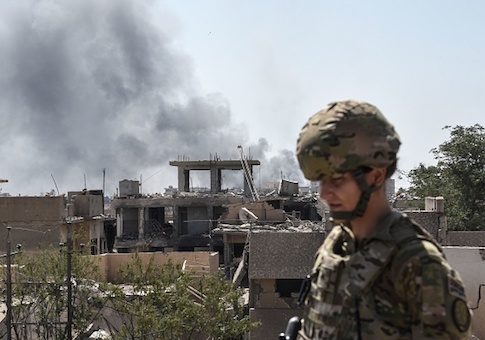Former attorney general Michael Mukasey criticized Congress for failing to pass a new law sanctioning the nation's ever-changing war against Islamist terrorist organizations.
The George W. Bush appointee said the 16-year-old congressional authorization for the use of military force (AUMF) against the perpetrators of the September 11, 2001 attacks is outdated, particularly given the dynamic threats facing the United States today.
The executive branch has used the Sept. 11 authorization to justify the open-ended war on terrorism against enemies with ambiguous links to those responsible for the attacks. President Donald Trump, like his predecessor, maintains the law provides the legal authority to fight jihadists independent from al Qaeda and the Taliban and outside of Afghanistan and Iraq.
Testifying before the House Foreign Affairs Committee on Tuesday, Mukasey said he supported the new AUMF legislation introduced by Sens. Jeff Flake (R., Ariz.) and Tim Kaine (D., Va.) that would authorize combat against al Qaeda, the Taliban, and the Islamic State for five years. It includes a measure that would allow Congress to expedite reauthorization before it expires.
The legislation, introduced in May, would also enable the president to declare new "associated forces," or spinoff militant groups, covered by the war authorization while allowing Congress the opportunity to either accept or reject the addition.
"This is a rational way to treat the issue, otherwise you have the exercise we have now, which is to conduct a DNA test on groups [to determine] whether they do or don't carry the DNA of al Qaeda," Mukasey said.
Lawmakers have debated for years whether the 2001 authorization applies to ISIS, as former president Barack Obama claimed when the U.S. invaded Syria, even though the group did not exist 16 years ago. But efforts to enact a new ISIS-specific AUMF have stalled amid disagreements regarding the limits that should, or should not, be placed on the president to conduct war.
House Speaker Paul Ryan last week stripped an amendment from a defense spending bill that would have repealed the current AUMF and forced Congress to pass a new authorization for the war on ISIS.
Rep. Barbara Lee (D., Calif.), who introduced the amendment, accused the speaker of shirking the constitutional duty of Congress to set the parameters of war, but Ryan's office said the measure would have left U.S. troops on the battlefield without an authorization to battle al Qaeda and ISIS.
Mukasey said it would be "enormously dangerous" to repeal the law without first enacting a replacement authorization.
"It would set the debate as to whether there was existing authority to conduct any of the operations that we're conducting now and would signal to our adversaries a level of uncertainty that I think could invite additional attacks," he said.
